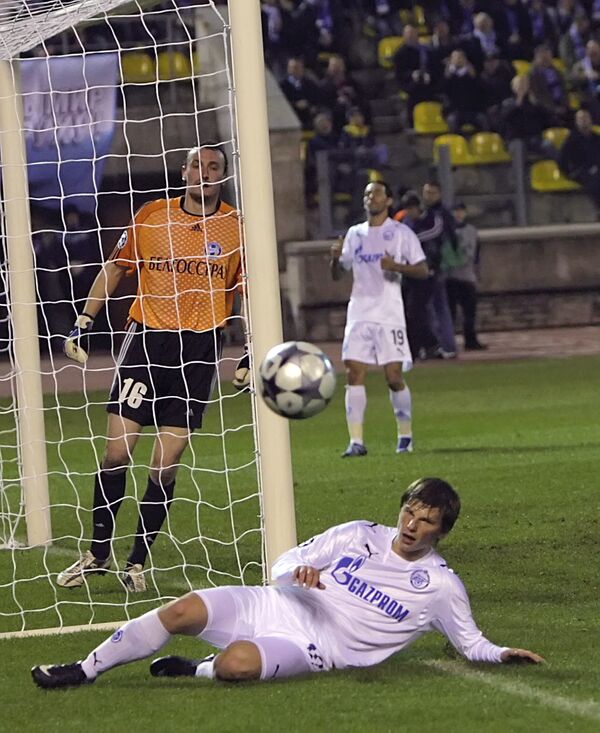MOSCOW, (RIA Novosti football expert Marc Bennetts)- Ahead of Manchester United and Barcelona's much-anticipated Champions League final in Rome, RIA Novosti asks if Russian clubs have a realistic chance of lifting the trophy in coming seasons.
In the autumn of 2006, a few months after Arsenal manager Arsene Wenger's famous (in Russia at least) prediction that a Russian club would win the Champions League in the next decade, I spoke to CSKA Moscow owner Yevgeny Giner at the club's offices.
Oil prices were at an all-time high, and the confidence oozed by Russian politicians and businesses had trickled down to its major clubs, with CSKA's 2005 UEFA Cup victory making it the first Russian team to lift a major European trophy. Able to draw on the seemingly bottomless resources of the country's oil and gas giants, Russian football's only problem was not so much meeting the salary demands of top players, but rather convincing them to make the move to a country still suffering from a major image problem.
Still, despite the difficulties of attracting genuine stars, Giner was certain that it was only a matter of time before the holy grail of European football found its way to Russia - preferably, one assumes, to CSKA's north Moscow base.
"I agree with Wegner wholeheartedly. Perhaps even sooner. Russian football is on the rise, a huge amount of money is currently being invested in it, and the infrastructure of the sport is being rapidly developed," he told me, puffing on a cigar.
However, the expected oligarch-backed march to the summit of European club football never materialized. Soon after we spoke, despite beating and drawing with Arsenal, CSKA were unfortunate to be knocked out of the 2006/07 Champions League, finishing third in Group G. The following season saw the former Red Army club fail to win a game in their group campaign.
Much was expected of an Andrei Arshavin-inspired and Gazprom-financed Zenit St. Petersburg in this year's tournament, but despite running Real Madrid and Juventus close in their first two matches, Zenit never seriously looked like making the play-offs.
And then the economic crisis hit. With the onset of the global downturn, both CSKA and Spartak Moscow have postponed ambitious plans for new stadiums, with Spartak's president, Leonid Fedun, saying it would be "madness" to continue construction in the current financial climate.
So, notwithstanding recent UEFA Cup success for Russian teams, was Wenger way off the mark? Or does Russian club football still have a glorious future?
Despite the fiscal gloom, Sergei Yegorov, head of the Sovetski Sport paper's football department, believes that Champions League success is realistic, if perhaps some way off yet.
"We have to take it step-by-step," he told me the day before the Barcelona-Manchester United clash. "It's a matter of economics. If we come out of the crisis, and the sport continues to develop, and we can attract star players, I see no reason why a Russian club can't eventually win the Champions League."
"I can't be as exact as Wenger and say it will happen within the next ten years, but CSKA's 2005 UEFA Cup win and Zenit's victory in the tournament last year mean it is obvious we are already on the right path. Of course, the UEFA Cup isn't on the level of the Champions League. Right now, our top clubs just can't challenge teams like Real Madrid when they are on form."
Former Manchester United star Andrei Kanchelskis failed however to share Yegorov's guarded optimism.
"Maybe in 50 years or so," the ex-Soviet and Russian international laughed. "The whole system of Russian football needs to change. Maybe then we'll have a chance."
"Basically," he commented, "a new generation of players needs to come through. We still have a long way to go before we can catch up with the leading countries, such as England, Italy and Spain."
As for the crisis, Kanchelskis noted that, "The economic downturn has affected the whole world, not just Russia. Football, including the Russian game, will get through it."
Ironically, given the influence that oligarchs have had on the domestic game, Oleg Romantsev's perestroika-era Spartak Moscow have so far been the only Russian side to reach the later stages of Europe's leading club competition. With the Soviet Union heading for collapse, his side of technically-gifted players fell to Marseille in the semifinals of the 1990/91 tournament after knocking out Real Madrid in the previous round.
Five years later, Spartak beat Blackburn Rovers, Legia Warsaw and Rosenborg home and away to claim a maximum 18 points in Champions League Group B. Unsurprisingly tipped as one of the potential winners of the tournament, financial problems meant that the club were forced to sell key players before the play-off stages, where they went out tamely to Nantes.
While it is as yet unclear what effect the crisis will have on Russian football, the national game looks unlikely to make a return to the cash-strapped 1990s. However, Simon Kuper, Financial Times sports writer and author of the forthcoming book, Why England Lose, feels that money isn't the only issue for the Russian game.
"Even if the poor oligarchs get their money back, the problem of the Russian league is that it's in Russia," he commented.
"Few great footballers want to go there. Firstly, because it's alien to them and secondly because it doesn't have a tradition. Yes, players are motivated by money. But the best can become multimillionaires at great traditional clubs in Italy, England or Spain. These guys don't have much of a reason to risk Russia, even if salaries there were higher."
"It's very hard to imagine Russian clubs winning the Champions League as more than a one-off. But a one-off victory, a la FC Porto or Ajax, is perfectly possible," he added.
For now though, Russian fans can only turn their attention to Rome on Wednesday and dream.
Marc Bennetts is the author of Football Dynamo: Modern Russia and the People's Game (Virgin Books)




